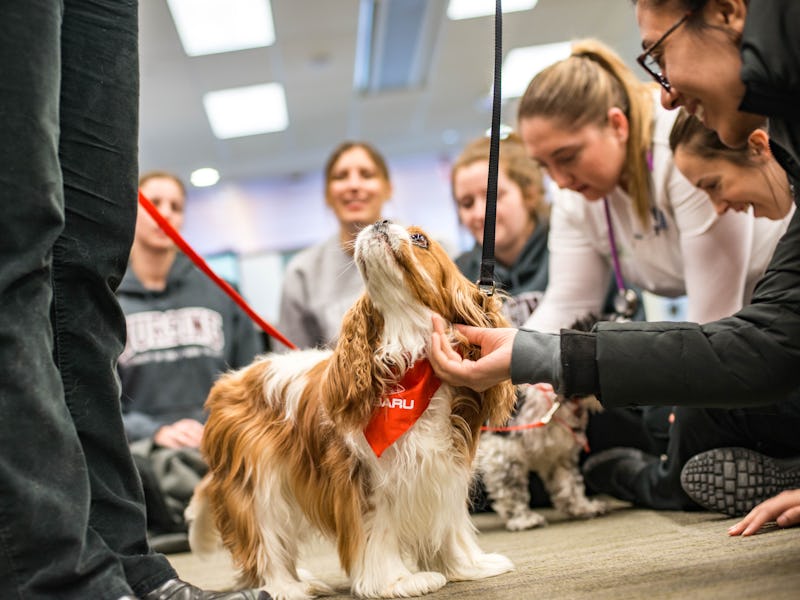Therapy Dogs Have an Important Role on College Campuses, Says Expert
“That’s what therapy dogs do."

As students head to college for their first day of classes, many are making themselves feel at home with an increasingly available form of support: therapy dogs.
A growing number of colleges across the country are offering pet-a-puppy events on move-in day, furry pick-me-ups in dorms, and special doggy office hours in hopes of relieving some of the pressures of school, as a Twitter moment documented on Tuesday.
The mental health benefits of dogs are well-documented. Studies show that petting a canine makes the heart rate slow down, blood pressure decrease, muscles relax, and breathing become more regular. Doing so even prompts changes in hormones: Levels of the stress hormone cortisol go down, and levels of the “happiness hormone” oxytocin increase, University of British Columbia psychology professor emeritus, Stanley Coren, Ph.D. tells Inverse.
“That’s what therapy dogs do. They provide instantaneous stress reduction,” he says.
The swiftness of our physiological response to dogs is significant. If you’re really stressed and you go to a doctor for prescription medication, you’ll mostly be given drugs called selective serotonin reuptake inhibitors (SSRIs, like Prozac), which can take up to six weeks to take effect, Coren says. But if you are able to pet a friendly dog, you’ll get similar stress reduction effects within a few minutes. Research published by Coren and his colleagues in the journal Stress and Health earlier this year shows that the effects of a good cuddle session can last up to 10 hours.
But are therapy dogs really necessary on the very first day of college? Probably not, Coren says. Universities first started hosting therapy dogs nearly a decade ago, but the canine stress relievers were only brought to campuses during exam time, when students’ stress levels were, understandably, high. The first week of school should not be as stressful in comparison, Coren says. Besides, there are plenty of other important social events that help students adjust to their new surroundings, new classes, and new roommates.
Nevertheless, no one turns down a chance to hang out with cute pups. And since therapy dog programs are largely volunteer-based, increasing their availability doesn’t cost colleges any money. They won’t replace human counselors any time soon, but the golden retrievers, boxers, border-collie mixes and other breeds all go through intense training to become registered as pet therapy animals.
Some research evidence suggests other animals can also provide similar therapy benefits, including cats, rabbits, horses, and even more exotic species. But part of the reason why dogs, in particular, give us such warm fuzzy feelings is because of their inherent qualities. A 2017 study showed, for example, that dog genes make them especially open to domestication and hypersocial behavior. Other studies have found that dogs can correctly read our facial expressions and respond to them at least 67 percent of the time.
“When you act positively toward a dog, it acts positively toward you and that sets up a reciprocal loop,” Coren says.
“They are a short-term intervention for stress,” he warns. “But a day without stress is worthwhile.”